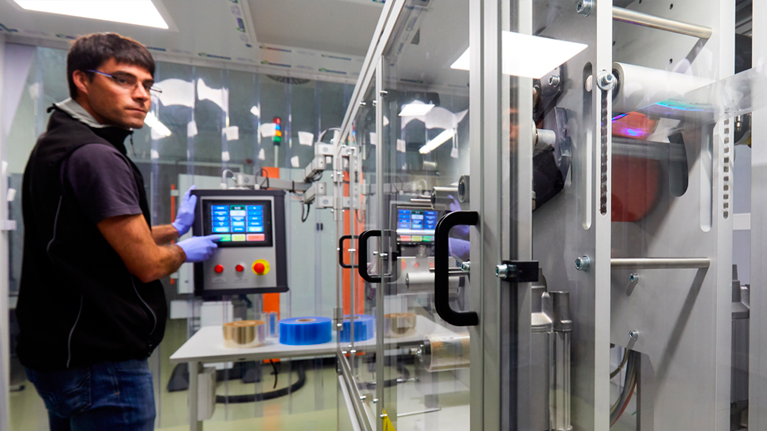Smart bio-based packages to improve food conservation and environmental preservation
The aim of the BIOSMART initiative coordinated by IK4-TEKNIKER is to design and develop a new generation of packaging to extend food shelf-life.

90 kilogrammes per person per year. According to FAO data, this is the amount of food wasted in Europe. At an international scale, it has been estimated that one third of the food produced ends up in a bin (Jenny Gustavson et al, Global food losses and food waste, FAO, 2011).
This does not only have a significant social impact, but also increases the level of CO2 emissions and, consequently, produces negative environmental effects.
In order to mitigate this problem, IK4-TEKNIKER, the Basque technology centre, is coordinating BIOSMART, an initiative whose aim is to develop a new generation of smart packages capable of improving food quality preservation and extending shelf life in order to lessen waste and reduce carbon dioxide emissions.
All containers developed under this initiative are manufactured based on natural organic materials to produce biodegradable and compostable containers convertible into biomass, CO2 and water, once used, or into recyclable containers to simplify subsequent processing and reutilization.
Solutions to extend food life
One of the most outstanding features of these biodegradable and/or compostable containers is that they are "smart" and feature functionalities allowing for internal gas monitoring and an extended half life of the food stored inside.
One of these functionalities will use sensors printed on the container to monitor and deliver information on the degree of preservation of the food it contains by monitoring internal gases in a controlled atmosphere. This makes it easier to guarantee correct food preservation.
BIOSMART containers will also feature optimum barrier effect properties to control patency to water, oxygen and CO2, and to block UV radiation causing the oxidation of fat, loss of vitamins, fading of colours and adverse effects affecting the flavour of certain types of food.
These containers will incorporate functionalities to prevent adhesion and proliferation of microorganisms in the form of bacteria, fungi and yeast and their growth inside the container to preserve food longer.
Phase-changing materials will also be included in the containers to regulate temperatures and maintain the cold chain from the moment food is bought until it reaches your home.
Cutting-edge technologies to achieve competitive production costs
The people responsible for the initiative will be using cutting-edge manufacturing technologies to achieve competitive production costs compared to the containers currently in use to further market penetration.
IK4-TEKNIKER has extensive experience in surface engineering that has given rise to multi-functional surfaces that improve the properties of the materials used and provide them with different functionalities that can be applied to a number of products.
It is in this specific context that IK4-TEKNIKER is working on key technologies such as Sol Gel to develop coatings that improve UV barrier properties in rigid and flexible films.
As regards materials for energy conservation, and within the framework of this project, the technology centre is also developing micro and nano capsules that contain biomaterials characterised by phase-change behaviour. These capsules are used as coatings for rigid and flexible film to ensure the cold chain of the packaged food. If the cold channel is disrupted, the encapsulated micro nano material absorbs heat from the environment and maintains an optimum temperature for the food inside (the so-called thermal regulation function).
Finally, IK4-TEKNIKER is working on the production of flexible micro and nano-texturised biofilms to incorporate anti-bacterial properties based on creating a surface topography. To achieve this, micro and nano-printing or nano-printing lithography technology is used.
Once the structures have been designed, manufactured and evaluated and transferred to biofilm in small parts (measuring only 10 cm x 10 cm), the results obtained are scaled at a pre-industrial level by means of the roll to roll technology. This technology allows for serial production of larger structured films that will be introduced in the market at a later stage.
Evaluating the materials and the containers produced
IK4-TEKNIKER plays an outstanding role as regards evaluating the behaviour of the different materials used for containers by running standard tests and employing cutting-edge technologies.
Specifically, the organisation focuses on characterising mechanical, superficial, thermal and biodegradability properties and addressing anti-bacterial activity of new materials developed within the framework of the programme.
It is also carrying out studies to ascertain and quantify the environmental impact produced by new containers by means of a life cycle analysis.
Finally, and in order to carry out the project in full, it is mandatory to comply with the current legislation on plastics in contact with food EC 1/2011, EC 1183/2012 and EC 2016/1416 and on active and smart materials and objects to be brought into contact with food EC450/2009.
This project has received funding from the Bio Based Industries Joint Undertaking under the European Union’s Horizon 2020 research and innovation programme under grant agreement No 745762.
